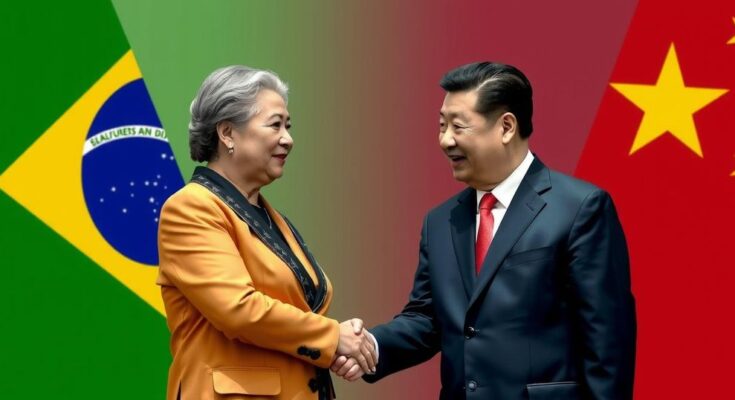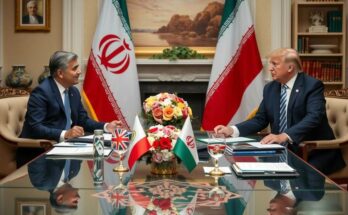Chinese President Xi Jinping and Brazilian President Luiz Inacio Lula da Silva have elevated bilateral relations to a strategic partnership aimed at promoting a just and sustainable global future. They signed nearly 40 cooperation agreements to enhance bilateral trade, while also discussing synergies with the Belt and Road Initiative. This visit signals China’s growing diplomatic clout amid a changing global landscape, particularly in light of U.S. foreign policy uncertainties.
Chinese President Xi Jinping and Brazilian President Luiz Inacio Lula da Silva announced the elevation of their nations’ partnership to a “Community with a Shared Future for a More Just World and Sustainable Planet” during a significant state visit. This milestone underscores China’s escalating diplomatic influence in the region. The two leaders reiterated their commitment to advancing bilateral trade, with Lula highlighting the signing of nearly 40 cooperation agreements, marking an economic relationship exceeding $150 billion.
The collaboration will include efforts to align Brazilian development initiatives with China’s Belt and Road Initiative, even though Brazil has not formally joined this global infrastructure project. Xi emphasized that these developments were integral to enhancing China-Brazil relations, stating, “This is another historic moment in the development of China-Brazil relations,” while conveying China’s intent to become “golden partners” in the eyes of the international community.
This state visit follows Xi’s recent participation in two major summits focused on global economic cooperation, indicating China’s robust engagement in multilateral forums amidst shifting global leadership dynamics. With the United States under President Joe Biden perceived as adopting a less proactive approach, Xi’s recent diplomatic efforts are being interpreted as a strategy to fill the resulting void in international relations, particularly in a landscape likely to face further challenges with the upcoming Trump administration.
The context of this article centers on a state visit by Chinese President Xi Jinping to Brazil, highlighting the strengthening of diplomatic and economic ties between the two nations. The remark that the relationship has transformed into a “Community with a Shared Future for a More Just World and Sustainable Planet” reflects China’s broader strategy to enhance relations with major global players, especially in light of fluctuating U.S. foreign policy under the transition of presidential administrations. Xi’s emphasis on a collaborative future mirrors China’s increased focus on establishing multilateral frameworks that promote its geopolitical objectives, particularly against the backdrop of existing tensions with Western countries.
In conclusion, the state visit between Xi Jinping and Luiz Inacio Lula da Silva marks a pivotal moment in China-Brazil relations, characterized by a commitment to deepen economic cooperation and address regional development. Despite Lula’s decision to remain outside China’s Belt and Road Initiative formally, the agreements signed reflect a strategic alignment of interests. Xi’s proactive diplomacy illustrates China’s intent to solidify its global influence and partnerships amid a changing geopolitical environment.
Original Source: www.voanews.com




